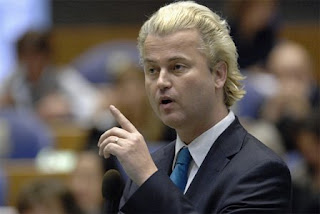The reaction of the Dutch government was astonishing, already long before the presentation. The Minister of Interior met with Mr. Wilders to discuss the launch of the movie, his main message: the movie will lead to profound reactions from the Muslim community and will mutilate the position of the Netherlands in the entire Muslim world. This is the limit! How much I disagree with Mr. Wilders on his stands related to the Quran (his most famous expression is that if we take out all the violent and un-free parts of the Quran we will have a booklet left of the size of a Donald Duck cartoon, he furthermore proposed to forbid the Quran in the Netherlands). Mr. Wilders has foremost the right to express his disagreement with the content of the Quran. If people have the right to believe in the text and express their beliefs freely, opponents have the right to express their disagreement.
If we even censure people that express their opinions about religious documents, we are giving the wrong response. It somehow seems that the government was afraid of the reaction to the movie before the movie had even been published: the possible reaction from the extremists is therefore decisive for the attitude of the government. Obviously making a movie about the negative sides of the Islam in respect to women and violence, whether true or not, is not the most suitable mean to discuss the role of a religion in our society. But in any case the movie has to be published if it does not call for violence or for violation of basic human rights, something that we actually didn’t even know back then because we hadn’t seen it yet!
In this debate the right to freely express your opinion is the most important value. Governments have to protect this freedom especially when it is at stake. This is properly done where the Dutch government provides persons like Mr. Wilders and Ayaan Hirsi Ali personal security, something they truly need since they are threatened on a frequent basis because of their particular views on Islam. If governments are not protecting my freedom of speech any longer, who else will do it? The small role the government should have is particularly the protection of basic rights such as freedom of expression and property.
Freedom of speech comes with a certain responsibility in our societies. This is simply a way to obtain a workable situation in these societies and a very important prerequisite for this freedom. The same responsibility applies to those who listen to a freely expressed opinion: be tolerant with other people’s ideas if they comply with the abovementioned prerequisite. Obviously this is the case when you criticise the Islamic holy script in its content, and this also applied last year on the (in)famous Mohammed cartoons published in Denmark.
Deze bijdrage van Jeroen Benning verscheen ook in de magazines New Libertas en Blauwdruk, bij de Mises Youth Club en bij LYMEC.
Meer teksten van deze auteur op www.newlibertas.eu.
6 Reacties:
- At 19:27 Anoniem said...
-
Mijneer Benning moet mij een zeggen welk standpunt hij hier inneemt, want op basis van zijn Voltaire-opener zou ik A denken, en op basis van de rest van zijn tekst eerder B. Inconsequentie is Vincent De Roeck's website niet vreemd, dat weet ik al wel, maar dit spant toch echt wel de kroon.
- At 10:03 Anoniem said...
-
Hugo, Jeroen Benning verdedigt gewoon het absolute recht van vrije meningsuiting maar roept hen die daarvan gebruik willen maken wel op om respect te tonen. Goed fatsoen zeg maar, moet niet met wetten worden afgedwongen, maar is een wezenlijk onderdeel van elke vrije samenleving.
- At 17:53 Anoniem said...
-
“I disapprove of what you say, but I will defend to the death your right to say it,” thus Voltaire.
____
Godsdangit! :) That quote was never by Voltaire!!
Some woman biographer shoved it in her book and people have been attributing it to Voltaire ever since. It was an English biography too, so it's never even been said in French.
It's a good quote, mind you, but it should be famous by itself, not by who didn't say it. - At 17:56 Anoniem said...
-
Wat die Wilders doet is enkel en alleen uitdagend gedrag vertonen. Steeds trekt hij de Islam door het slijk en alles wat met de Islam te maken heeft is in zijn ogen per definitie slecht. Hij voert er een kruistocht tegen, net zoals die onnozelaars die aanslagen willen plegen omwille van die film. Door zo een gedrag komen we niet tot een oplossing. En het helpt al helemaal niet om in deze concrete situatie plots te komen aandraven met grootspraak en citaten van filosofen.
- At 23:40 Anoniem said...
-
Islam is evil, so at least he's got that part right.
And Wilders' might indeed be on a "crusade", but I dare you to show me evidence of a single bomb he has set off. I prefer his crusade to the islamists' one... - At 12:12 Anoniem said...
-
@ Bram Muylle
Wel, mijnheer Muylle, als ik uw "net zo" goed begrijpt dan ziet u geen verschil tussen Wilders en islamisten. Dus, voor u is er een morele equivalentie tussen (A) een feitelijke film (i.e. een filmpje waarin feitelijke gebeurtenissen en feitelijke koran-citaten worden getoond) en (B) "aanslagen willen plegen omwille van die film".
Wel, mijnheer Muylle dat toont aan dat uw moreel discriminatievermogen niet veel beter is dan dat van vele islamisten. Dit oordeel berust op de observatie die we allemaal kunnen maken van uw commentaar.
Uw oordeel omtrent Wilders, daarentegen, berust op niets. Of eerder, het berust op een 'vooroordeel'. Maar, u heeft dat vooroordeel zeker wel dikwijls kunnen lezen of horen in de contemporele media. Doet aan papegaaien denken. Die hebben ook geen 'moreel discriminatievermogen' dat op iets zou trekken.
